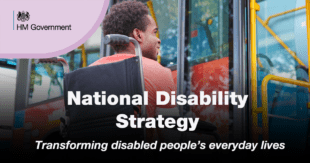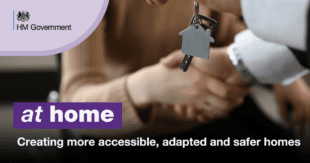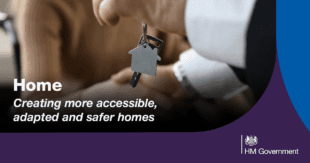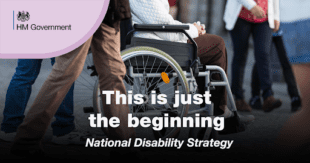We have published the Government’s National Disability Strategy.
Over one in five people in the UK are disabled.
'What does disability mean to me? The usual connotations - I find it harder to do certain things than others would. I see things differently. I don’t struggle. I have just spent my life finding efficient ways of getting round the challenges I’ve had.'
- Beth
Our vision is to transform the everyday lives of disabled people by tackling the barriers people face. So we can build back better towards a society that works for everyone. The strategy sets out immediate actions we will take on our path towards a longer-term goal, rooting the strategy in the everyday experience of disabled people.

This series explains the strategy’s eight key themes, and how we are making improvements to every part of a disabled person’s day. From the moment someone gets up to the moment they end their day.
Home: Creating more accessible, adapted and safer homes

Having a home that is suitable for a person’s needs is fundamental to being able to thrive and live an independent life in our society. However, many disabled people wake up every morning in a home that is not adapted to their needs.
47% of disabled respondents to the UK Disability Survey reported having at least ‘some difficulty’ getting in and out of where they live.
Accessible housing
Although there have been many improvements in accessible housing for disabled people in recent decades, disabled people tell us there is still much further to go.
Housing improvements have been aided by tightened regulations and increased awareness of inclusive design. Homes in England with key accessible features nearly doubled between 2009 and 2018, from 5% to 9%.
A decent home
A decent home is the foundation of an independent life. A decent home will mean different things to different people. A home with good public transport, close to family and friends, can be as important as a home with the right adaptations. Driving choice is key.
'It’s so important to see things and still be part of the world.'
-Tony

We will take immediate steps to:
- boost the supply of housing for disabled people by raising the accessibility of new homes, increasing the supply of affordable homes, including supported housing, and accelerating the adaptation of existing homes
- extend disabled tenants’ rights on accessibility
- ensure the safety of disabled people in buildings, for when there are emergencies.
We want to ensure that disabled people also have the opportunity to own their own home. About half of the homes delivered under the £11.5 billion Affordable Homes programme will be open to a new Shared Ownership scheme. This will help aspiring homeowners to take their first step on to the housing ladder.
We will accelerate the delivery of adaptations to existing homes too. In England and Wales we will do this by improving local delivery of the Disabled Facilities Grant.
'To actually go out of the door, without anyone helping me, was incredible.'
-Joyce
What are our next steps?
- The Ministry for Housing Communities and Local Government (MHCLG) will aim to ensure that 10% of the 180,000 homes being built through the £11.5bn Affordable Homes Programme will be supported housing.
- The Department for Health and Social Care (DHSC), working with MHCLG, has committed to invest £71 million in the Care and Support Specialised Housing Fund in the financial year 2021/22.

This is only the beginning.
We see the National Disability Strategy as a dynamic plan that we will refresh regularly in response to disabled people’s priorities.
Join the conversation
- Sign up to our newsletter to hear what we’re doing.
- Follow us on Twitter to stay up-to-date with our plans.
Want to know more about the National Disability Strategy?
Read about the other seven Strategy themes:
- Rights and perceptions: Removing barriers to participating fully in public and civic life and wider society
- Transport: Improving the accessibility and experience of everyday journeys
- Jobs: Making the world of work more inclusive and accessible
- Education: Ensuring children and young people fulfil their potential
- Shopping: Creating more consumer choice and convenience
- Leisure: Widening access to arts, culture, sport and the great outdoors
- Public services: Making access as smooth and easy as possible
Leave a comment